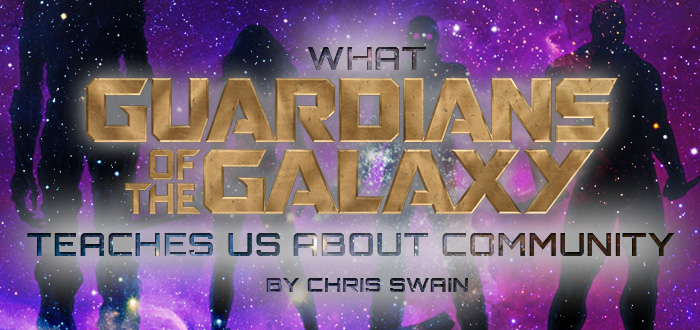The following post is written by Chris Swain, Director of Lifeway Student Ministry Publishing
[SPOILER ALERT] Guardians of the Galaxy grossed over a half billion dollars at the box office worldwide. Like most super hero movies it has all the bases covered: awesome super powers, an evil villain bent on destroying/controlling the world, elaborate fight scenes, massive special effects, and a steady stream of one-liners.What’s interesting is that beyond the standard fare, Guardians has a unique message about community. Of course, there are similarities to other “super group” movies like The Avengers, The X-Men, and the like. The difference here is that the focus on the team coming together is as much the resolution of the story as defeating the bad guy. Simply put, Guardians of the Galaxy is a story about community. Nowhere in the movie is this more clearly seen than in the sacrifice of one of the main characters: a tree-like humanoid named Groot. Throughout the movie, Groot speaks with one line and one line only: “I am Groot.” While actor Vin Diesel who voiced Groot did change the intonation of the statement, it was his primary means of communicating just about everything. His closest friend Rocket, a mutated raccoon, had the ability to translate the sentence into whatever Groot was actually intending.
As the team found itself on the brink of death, hurling toward the planet without a parachute, Groot grew into a protective cocoon. Rocket knew that this would kill Groot and asked his friend why he was sacrificing himself. Groot responded differently for the first time in the movie with, “We are Groot.” It was an emotional scene and director James Gunn succeeded, in that single moment, in transforming the Guardians from selfish individuals to a community with purpose. Ultimately, the rest of the team took Groot’s lead and banded together to overcome the bad guy and save the planet.
This kind of thing is precisely what student pastors would love to see happen in their ministries. Imagine what could happen if students embraced the words of Paul in 1 Corinthians 12:12 “12 For as the body is one and has many parts, and all the parts of that body, though many, are one body—so also is Christ.” But how can a student leader make this happen?
There really is no secret to transitioning from a group of individuals into a group of like-minded believers with the goal of loving God and loving others, but there are a few things that can help with the process.
- Teach on unity. Do a series or a group study on the issue of unity. Help students understand what the Word has to say about being unified as the body of Christ. If they don’t know what God has to say about it, they won’t know how to live it out.
- Organize your ministry to be inclusive. It can be easy to create segments within your ministry. Often, we do so because it mirrors the local school system or it helps break the group down into smaller groups that are more manageable. But it is crucial that your older students are connected with your younger students, and that your athletes are connecting with your tech lovers, etc. You cannot and should not force friendships but you can create environments that are conducive to unity and biblical community.
- Develop students as leaders. When students are put in leadership roles they are far more likely to understand the bigger picture. The pressure of leading can be a positive force to help students understand why community is so crucial.
One of the greatest challenges of student ministry is helping students fight the status quo of cliques. But biblical community can only happen when students begin to embrace their identity in Christ. Understanding that they are part of one body will help students embrace community for greater growth and impact. This is how they can move from my student ministry to our student ministry. From “I am Groot” to “We are Groot.”



